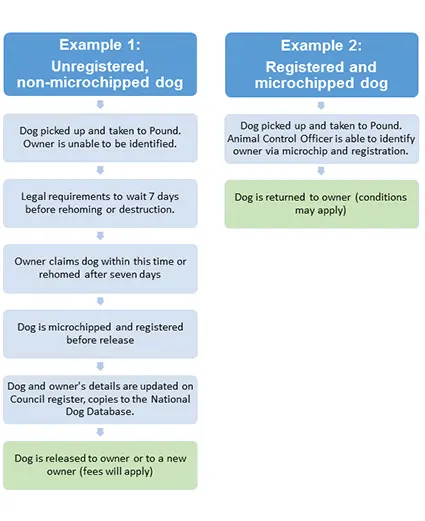Our dog impounding process
If dogs are roaming or seized by an animal control officer because they’re unregistered or have attacked a person or animal, they will be taken to the Waitomo District Council dog pound.
If a registered dog hasn’t been in the pound in the last two years and there are no other reasons that the dog has been impounded, we will return the dog to its home, as long as the owner is there and the dog can be secured.
We do our best to work with owners first by talking to them about the regulations of the Dog Control Act and the Dog Control Bylaw. If an owner does not comply then a letter will be sent as a warning notice. As a last resort Animal Control will seize and impound the dog.
What happens when a dog is impounded?
We have a purpose built, modern pound with individual pens. The pound is designed to minimise contact between dogs to reduce injury and spread of disease.
The Dog Control Act 1996 sets minimum standards around what we must do to locate an owner. If we can’t contact the owner by phone we must write to the last known address of the owner. We usually visit the last known address, and if unable to speak to the owner at that address, we send letters in the post.
The owner has seven days from the date of the letter to make contact with Council and pay any fees to release the dog. This system relies on owners keeping Council updated with their most recent contact details – and this is a legal requirement under the Act.
If the dog is registered our general practice is to hold the dog for a further seven days before making a decision on the dog’s future.
Often dogs have lost their collar by the time they are impounded so having your dog implanted with a functioning microchip which has been notified to Council is an enormous help and provides proof of ownership.
What happens to unclaimed dogs?
If we haven’t heard from the owner within the allotted time or they haven’t paid the required fees the Dog Control Act states the dog may be sold, destroyed or otherwise disposed of. Only dogs deemed suitable for home placement can be adopted or rehomed. Dogs classified as dangerous will not be rehomed.
We work with well-respected rehoming agencies who de-sex dogs before they are rehomed.
A fee of $140 applies for the rehoming of an impounded dog.
Temperament testing
Before making a decision on rehoming a dog, the dog will be temperament tested. Animal control officers assess dogs in their care and make decisions as to which dogs are suitable for testing. Officer safety and risks to other animals are the main considerations before testing begins. Dogs showing aggression are not tested.
There are some dogs that will never be rehomed, this includes:
- any dog that has been impounded that has a history of aggression
- any American Pitt Bull Terrier type and crossbreeds of them
- any dog that any officer assesses as not meeting our temperament standards.
There are only five situations where Council may euthanize a dog, they are:
- when an unregistered dog has been impounded and 7 days has elapsed from when the owner was notified and they haven’t claimed the dog.
- when an unregistered dog has been impounded, we don’t know who the owner is, seven days has elapsed and no owner has claimed the dog.
- where Council has accepted a dog which the owner has surrendered to them. (This is limited to special circumstances. Council does not generally accept dogs that owners no longer want).
- at the conclusion of a prosecution and the Court has made a destruction order.
- where the dog is injured or sick, to prevent the animal suffering and has been authorised by a veterinarian.
All euthanasia is undertaken by a qualified veterinarian.
Impounding Process
The following chart shows two examples of the impounding process. As you can see the process of reuniting a dog with its owner is much quicker, when it is registered and microchipped.

